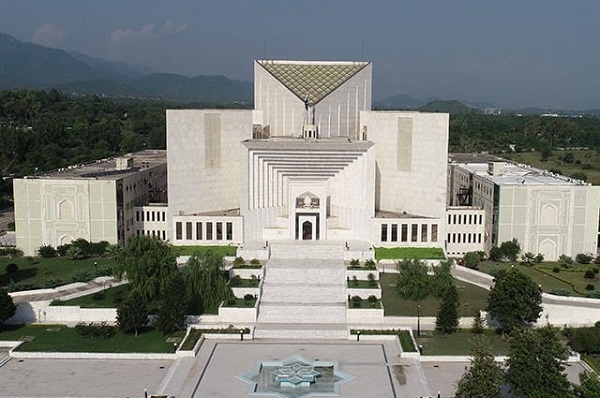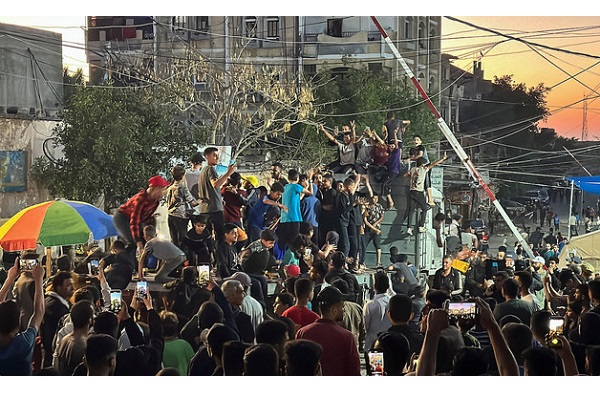PESHAWAR: The Supreme Court on Monday suspended the Peshawar High Court’s (PHC) verdict denying the Sunni Ittehad Council (SIC)
ISLAMABAD: The Supreme Court on Tuesday affirmed the conviction of two former army officials for their role in overthrowing the government of Benazir Bhutto in 1995, ruling that the Pakistan Army Act allows for punishment under alternative charges and offences.
A three-member bench of the apex court, presided over by Chief Justice Umer Ata Bandial and including justices Munib Akhtar and Sayyed Mazahir Ali Akbar Naqvi, issued the judgment in the case of two former army officials who were accused of conspiring to wage war against Pakistan and toppling the federal government of Benazir Bhutto in 1995.
The court rejected the appeals of Col (retd) Muhammad Azad Minhas and Col (retd) Inayatullah, who were challenging their conviction by a Field General Court Martial.
Col. Muhammad Azad Minhas had challenged the Lahore High Court’s 2015 verdict dismissing his petition against his conviction, while Col. Inayatullah Khan had contested his sentence in the Supreme Court in 2000.
The Supreme Court, after considering both appeals from 2020 to 2022, had reserved its verdict.
Justice Sayyed Mazahir Ali Akbar Naqvi, in a 17-page judgment, stated: “Section 111(5) of the Pakistan Army Act and Rules 21(4) and 51(7) and (8) speak about the framing and punishment of an accused under an alternative charge or offence.”
The court observed that both the appellant and petitioner were charged not only with the main offence but also with alternative charges and offences, as indicated in the charge sheet.
The court said: “It is now well settled that if an accused is charged with one offence but the evidence suggests he committed a different offence for which he could have been charged under the same provisions of law, he may be convicted for the offence he is found to have committed, even if he was not charged with it.”
In this case, the court observed that the appellant and petitioner were charged with both the main offence and alternative charges, as evident from the charge-sheet.
The court upheld that all courts, after evaluating the prosecution’s evidence, found insufficient proof of the main offence but enough evidence to sustain their conviction under the alternative charge.
Regarding the objection to the charges, the judgment stated: “Needless to mention that when the appellant or petitioner had filed constitutional petitions before this court in the year 1996, although charges had been framed at that time, they never raised this objection before any court, including this court, at that juncture of time as to why they had been charge-sheeted for the alternative offences.”
The court further explained that the appellant and petitioner had filed petitions in 1996 challenging their arrest, detention, and trial by the Field General Court Martial under Article 184(3) of the Constitution of the Islamic Republic of Pakistan. However, their petitions were dismissed on May 14, 1996.
Subsequently, their trials proceeded, resulting in their dismissal from service and rigorous imprisonment for two and four years, respectively, in an order dated September 30, 1996. Their conviction was confirmed by the Chief of Army Staff via an order dated October 28, 1996. Both individuals filed appeals, which were also dismissed on November 6, 1997.
The court also addressed the jurisdiction exercised by the Supreme Court under Article 184(3) of the Constitution, comparing it to the power available to high courts under Article 199 of the Constitution. It cited previous judgments and observed that fundamental rights are guaranteed to citizens, and violations can be redressed through the courts.
The court clarified that sentences awarded by a court-martial or another forum under the Pakistan Army Act, 1952, are subject to judicial review only on grounds of mala fides, including malice in law, without jurisdiction, or coram nonjudice. In the absence of mala fide on the part of the prosecution, the court held that the convictions and sentences of the appellant and petitioner by the Field General Court Martial could not be deemed coram nonjudicial.
You May Also Like
GAZA: Palestinian militant group Hamas on Monday agreed to a Gaza ceasefire proposal from mediators, but Israel said the terms did not meet
WASHINGTON: A former high-profile agent of the US Federal Bureau of Investigation (FBI), Kamran Faridi has been released from a Florida






